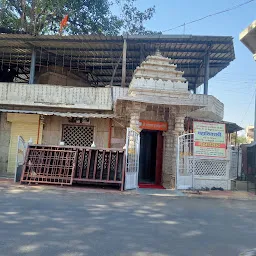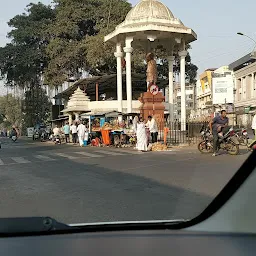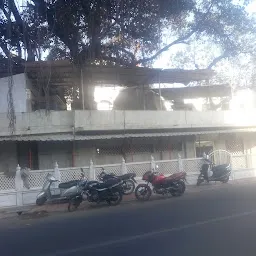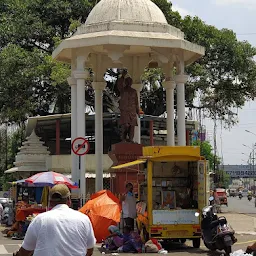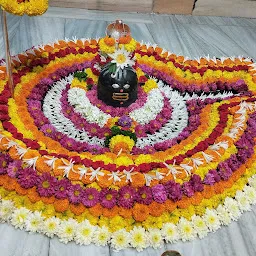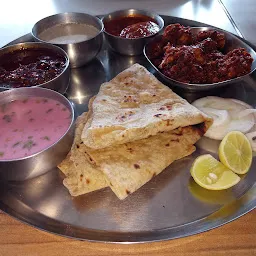Mahadev Temple
P63V+WQ3, Shahupuri, Kolhapur, Maharashtra 416003, IndiaMahadev Temple is a hindu temple located in Kolhapur, Maharashtra. The average rating of this place is 5.00 out of 5 stars based on 15 reviews. The street address of this place is P63V+WQ3, Shahupuri, Kolhapur, Maharashtra 416003, India. It is about 0.08 kilometers away from the Kolnur railway station.
- Where is Mahadev Temple located?
- Mahadev Temple is located at P63V+WQ3, Shahupuri, Kolhapur, Maharashtra 416003, India.
- What is the nearest railway station from Mahadev Temple?
- Kolnur railway station is the nearest railway station to Mahadev Temple. It is nearly 0.08 kilometers away from it.
Bharat Rohidas Kharbude 34 months ago
Shiva has pre-Vedic tribal roots,[14][15] and the figure of Shiva as we know him today is an amalgamation of various older non-Vedic and Vedic deities, including the Rigvedic storm god Rudra who may also have non-Vedic origins,[16] into a single major deity.[17][18][19][20]
Shiva is known as "The Destroyer" within the Trimurti, the Hindu trinity that includes Brahma and Vishnu.[1][21] In the Shaivite tradition, Shiva is the Supreme Lord who creates, protects and transforms the universe.[11][9][10] In the Shakta tradition, the Goddess, or Devi, is described as one of the supreme, yet Shiva is revered along with Vishnu and Brahma. A goddess is stated to be the energy and creative power (Shakti) of each, with Parvati (Sati) the equal complementary partner of Shiva.[22][23] He is one of the five equivalent deities in Panchayatana puja of the Smarta tradition of Hinduism.[12]
Shiva is the primal Atman (soul, self) of the universe.[24][25][9] There are many both benevolent and fearsome depictions of Shiva. In benevolent aspects, he is depicted as an omniscient Yogi who lives an ascetic life on Mount Kailash[1] as well as a householder with wife Parvati and his two children, Ganesha and Kartikeya. In his fierce aspects, he is often depicted slaying demons. Shiva is also known as Adiyogi Shiva, regarded as the patron god of yoga, meditation and arts.[26][27][28]
The iconographical attributes of Shiva are the serpent around his neck, the adorning crescent moon, the holy river Ganga flowing from his matted hair, the third eye on his forehead, the trishula or trident, as his weapon, and the damaru drum. He is usually worshipped in the aniconic form of lingam.[2] Shiva is a pan-Hindu deity, revered widely by Hindus, in India, Nepal and Sri Lanka.[29][18]
Etymology and other names
Main article: Shiva Sahasranama

An ancient sculpture of Shiva at the Elephanta Caves, Maharashtra
The Sanskrit word "śiva" (Devanagari: शिव, also transliterated as shiva) means, states Monier Monier-Williams, "auspicious, propitious, gracious, benign, kind, benevolent, friendly".[30] The roots of śiva in folk etymology are śī which means "in whom all things lie, pervasiveness" and va which means "embodiment of grace".[30][31]
The word Shiva is used as an adjective in the Rig Veda (approximately 1700–1100 BC), as an epithet for several Rigvedic deities, including Rudra.[32] The term Shiva also connotes "liberation, final emancipation" and "the auspicious one", this adjective sense of usage is addressed to many deities in Vedic layers of literature.[30][33] The term evolved from the Vedic Rudra-Shiva to the noun Shiva in the Epics and the Puranas, as an auspicious deity who is the "creator, reproducer and dissolver".[30][34]
Sharva, sharabha presents another etymology with the Sanskrit root śarv-, which means "to injure" or "to kill",[35] interprets the name to connote "one who can kill the forces of darkness".[36]
The Sanskrit word śaiva means "relating to the god Shiva", and this term is the Sanskrit name both for one of the principal sects of Hinduism and for a member of that sect.[37] It is used as an adjective to characterize certain beliefs and practices, such as Shaivism.[38]
The Vishnu sahasranama interprets Shiva to have multiple meanings: "The Pure One", and "the One who is not affected by three Guṇas of Prakṛti (Sattva, Rajas, and Tamas)".[39][40]
Shiva is known by many names such as Viswanatha (lord of the universe), Mahadeva, Mahandeo,[41] Mahasu,[42] Mahesha, Maheshvara, Shankara, Shambhu, Rudra, Hara, Trilochana, Devendra (chief of the gods), Neelakanta, Subhankara, Trilokinatha (lord of the three realms),[43][44][45] and Ghrneshwar (lord of compassion).[46] The highest reverence for Shiva in Shaivism is reflected in his epithets Mahādeva ("Great god"; mahā "Great" and deva "god"),[47][48] Maheśvara ("Great Lord"; mahā "great" and īśvara "lord"),[49][50] and Parameśvara ("Supreme Lord").[51]
venkat 46 months ago
Very nice mahadev old temple near CBS kolhapur.
Mahesh Chougule 58 months ago
This is small but beautiful temple of Lord Shiva.
- Address
- P63V+WQ3, Shahupuri, Kolhapur, Maharashtra 416003, India
